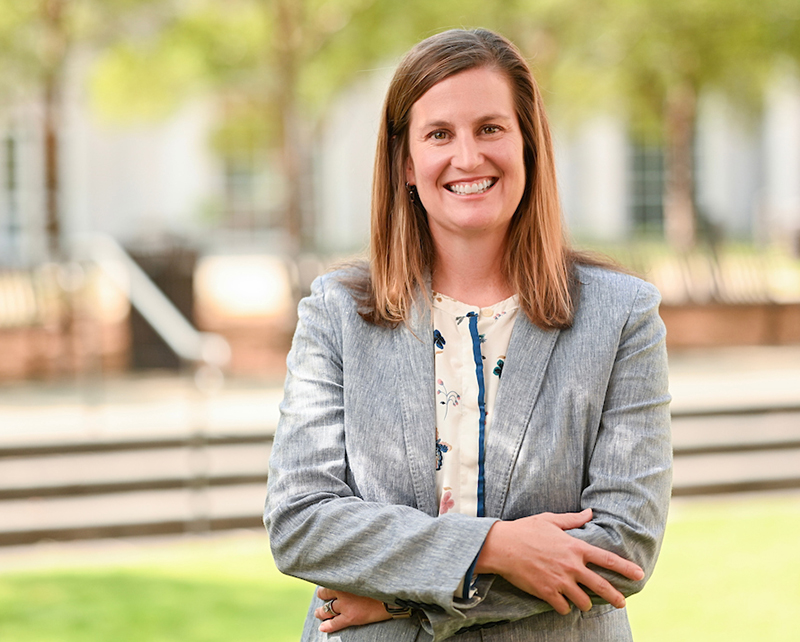
“Project-based classes like this give students a chance to experience industry problems
and complexities in a safe environment as they take theory-based education and model
it into practical uses.”
Global retailer Abercrombie and Fitch Co., the parent company of Abercrombie & Fitch,
Hollister Co., and Abercrombie kids, reaches its customers using multiple channels,
including its user-friendly e-commerce sites and its unique, engaging in-store experiences.
The company is focused on providing a seamless experience to its customers, and in
recent years, it has built robust omnichannel capabilities to meet its customers’
evolving needs.
These needs include the ability to smoothly transition across channels, such as purchasing
items online and returning in store. With that, however, comes challenges, and to
help A&F Co. as it explored solutions for optimizing the customer experience as it
relates to returns, the company tapped Glenn Richey’s capstone Advanced Supply Chain
Strategy graduate course. Last spring, the class was tasked with evaluating Abercrombie
and Fitch Co.’s customer feedback on its omnichannel experience, including the return
process, and proposing solutions based on that feedback.
 “We find business partners that have a disruption – hopefully something hot in supply
chain – and help find solutions to meet their needs,” said Richey, Harbert Eminent
Scholar in Supply Chain Management at the Harbert College of Business. “Abercrombie
& Fitch Co. shared customer feedback to review, and the class evaluated all comments
related to the return-exchange process,” said Richey. “A frictionless shopping experience
is important now more than ever to customers, so enabling experiences that make it
easy for customers to return their product, while also ensuring they want to come
back and shop in the future, is a priority.”
“We find business partners that have a disruption – hopefully something hot in supply
chain – and help find solutions to meet their needs,” said Richey, Harbert Eminent
Scholar in Supply Chain Management at the Harbert College of Business. “Abercrombie
& Fitch Co. shared customer feedback to review, and the class evaluated all comments
related to the return-exchange process,” said Richey. “A frictionless shopping experience
is important now more than ever to customers, so enabling experiences that make it
easy for customers to return their product, while also ensuring they want to come
back and shop in the future, is a priority.”
The class recommended a range of specific enhancements to the returns process, including
the physical return process, to the in-store return experience, online experience,
and additional specialized training for managers and employees to better adapt to
the returns process.
“The students took a hard look at data, such as sensitivity to cost, operational changes
and more to understand reasons for returns,” said Donnie Franzen, Sr. Director, Omnichannel
& Order Management, Abercrombie & Fitch Co. “They also researched the broader retail
landscape to help us understand where we are in terms of experience parity – are there
innovations we should consider in our operations or technology? Ultimately, we were
able to align the students’ findings with our list of existing opportunities, and
we also uncovered a few new ideas for future consideration.”
Jonathan Lieberman, an online MBA student from Fort Worth, Texas, said projects such
as these are paramount for students entering the job market. “Undergraduate or graduate
students in the job search often think only past jobs or internships count as experience,
but that’s not always the case” said Lieberman, who works on Lockheed Martin’s Operations
Leadership Development team. “Project-based classes like this give students a chance
to experience industry problems and complexities in a safe environment as they take
theory-based education and model it into practical uses. For some that have very little
to no experience, this will give them a taste of the real world and what to expect,
or how companies operate. For those with more experience, it allows them to see how
other industries or competitors are solving the same issues they might be facing.
Either way, students can walk away with a new perspective.”
The class presented its recommendations to Abercrombie and Fitch Co., as well as to
senior supply chain industry executives, at the annual Retail Industry Leaders Association
conference this past January in Orlando, Florida. “We immediately had senior executives
come up to us and ask, ‘How do we get involved in this?’” Richey said. “We’re looking
forward to taking an even deeper dive into the retail industry with future class projects.”


 Degrees & Programs
Degrees & Programs
 Faculty & Staff
Faculty & Staff
 Career Development
Career Development
 Recruiters & Industry
Recruiters & Industry

 “We find business partners that have a disruption – hopefully something hot in supply
chain – and help find solutions to meet their needs,” said Richey, Harbert Eminent
Scholar in Supply Chain Management at the Harbert College of Business. “Abercrombie
& Fitch Co. shared customer feedback to review, and the class evaluated all comments
related to the return-exchange process,” said Richey. “A frictionless shopping experience
is important now more than ever to customers, so enabling experiences that make it
easy for customers to return their product, while also ensuring they want to come
back and shop in the future, is a priority.”
“We find business partners that have a disruption – hopefully something hot in supply
chain – and help find solutions to meet their needs,” said Richey, Harbert Eminent
Scholar in Supply Chain Management at the Harbert College of Business. “Abercrombie
& Fitch Co. shared customer feedback to review, and the class evaluated all comments
related to the return-exchange process,” said Richey. “A frictionless shopping experience
is important now more than ever to customers, so enabling experiences that make it
easy for customers to return their product, while also ensuring they want to come
back and shop in the future, is a priority.”


